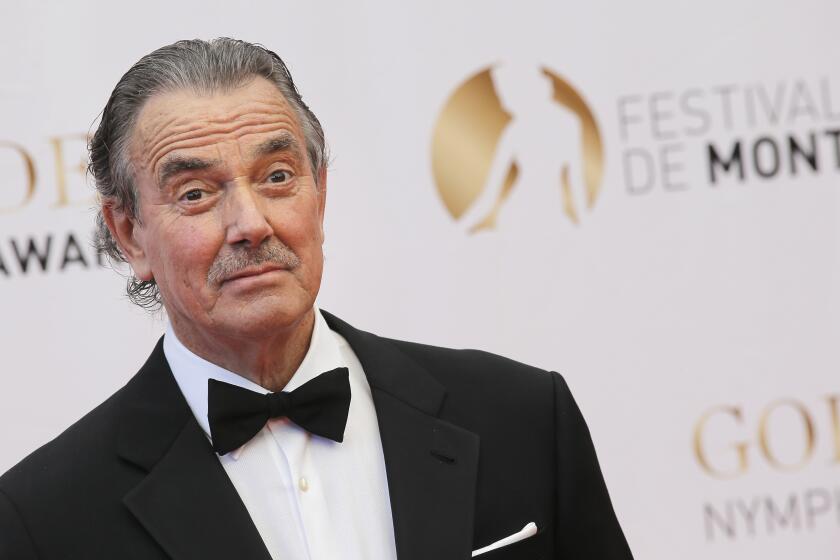Hugh Hefner helps present a Humphrey Bogart retrospective
Hugh Hefner has a confession.
“I think I opened the first Playboy Club because of ‘Casablanca.’ I wanted to have a place where people came to hang out as they did at Rick’s,” admits the pajama-clad founder of the Playboy empire.
The Oscar-winning 1942 “Casablanca,” starring Humphrey Bogart and Ingrid Bergman as the reunited lovers Rick and Ilsa, is the favorite film of Hefner, a serious movie buff.
“It has everything -- not only Bogie’s charismatic character, but lost love, redemption, patriotism, humor -- it had a great musical score.”
The 83-year-old Hefner explains that he first became acquainted with Bogart as a kid when the actor was playing gangsters for Warner Bros. in the 1930s.
“Then at the end of the ‘30s and the very beginning of the ‘40s, Bogie created this antihero that I very much identified with,” Hefner says.
On the 50th anniversary of the romantic drama in 1992, Hefner got a 35-millimeter print of the classic from Warner Bros. and screened it at the Playboy Mansion.
“Before that I had been running new movies Friday and Sunday nights, and we had reached a point quite frankly where it was difficult to find more than 52 new movies a year that you really wanted to run. I ran ‘Casablanca’ on Friday, and then on Saturday I ran ‘To Have and Have Not.’ By then we were all hooked.”
Hefner is bringing his love for Bogart to the UCLA Film and Television Archive’s Billy Wilder Theater. He is the guest curator of the retrospective series, “Here’s Looking at You, Humphrey Bogart,” which begins Friday and continues through April 10.
A longtime supporter and advocate for film restoration, Hefner’s also produced many documentaries on legendary stars of the golden era, including Rita Hayworth. In fact, his Hugh M. Hefner Classic American Film Program is co-presenter of the Bogart festival.
“I think sometimes Bogart is one of those guys who is so big and so mythic, you maybe don’t think of doing something on him,” notes UCLA programmer Paul Malcolm. “But when Hefner suggested Bogart, we realized we could do something great in collaboration with Hefner as guest curator.”
Hefner chose what he considers the five quintessential Bogart films: “Casablanca,” 1941’s “The Maltese Falcon,” 1944’s “To Have and Have Not,” 1946’s “The Big Sleep” and 1948’s “Key Largo.”
“We thought to put those films in perspective; we could highlight just how extraordinary those roles were for him for his career, his image and for American culture,” Malcolm says.
The retrospective also offers a lot of Bogart films that are rarely seen, including 1937’s “Marked Woman” on Saturday, in which he plays a D.A.; two surreal and fun film noirs from 1947, “Dark Passage” and “Dead Reckoning” on March 13; two dramas in which he plays crusaders for justice: 1952’s “Deadline -- U.S.A.” and 1951’s “The Enforcer,” screening March 14; and his last movie gangster role in 1955’s “The Desperate Hours” on March 20.
Sadly, Hefner never got a chance to meet his idol, who died of cancer in 1957 at the age of 57.
Hefner will be appearing at the screening on March 25 to introduce “The Maltese Falcon” because it was the one in which Bogart first introduced his romantic antihero. Bogart plays private eye Sam Spade in the classic noir, which marked John Huston’s directorial debut and the beginning of a beautiful collaboration between star and director.
“I am going to read the notes that I read when we run ‘Maltese Falcon’ here at the mansion,” Hefner says.
(Though not included in the retrospective, another Bogart classic, 1951’s “The African Queen,” for which he won his only best actor Oscar, is arriving on DVD on March 23. The Technicolor film, directed by John Huston and also starring Katharine Hepburn, has been beautifully restored.)
Though Bogart’s legendary tough guy image, complete with trench coat, fedora hat and unfiltered cigarette, are part of the world’s culture, it took the actor a while to find his niche.
In fact, nothing much happened to the Broadway actor when he first came to Hollywood in 1930 to appear in John Ford’s “Up the River” with Spencer Tracy for Fox. He moved over to Warner Bros. and did a few minor roles in unforgettable movies while appearing in comedies and melodramas on Broadway.
But his career changed in 1935 when he was cast in the Broadway play “The Petrified Forest,” opposite Leslie Howard. Bogart electrified the Great White Way as the escaped killer Duke Mantee, who holds a group of people hostage at a desolate cafe in the Petrified Forest. Howard played a troubled poet at the cafe.
“Thank God, Leslie Howard insisted on him coming out to do the movie,” says film historian Rudy Behlmer.
Warner Bros. wanted one of its big gangster stars, Edward G. Robinson, to play Mantee in the 1936 film. “Howard said no Bogie, no Leslie,” Behlmer says.
Howard was a huge star, and Warner Bros. gave him his wish. Bogart was equally effective in the film version, which opens the festival Friday evening with another terrific gangster performance from Bogart in 1937’s “Dead End.”
“He was stuck playing the ruthless guy,” says Behlmer, “but fortunately the aspects of his personality won out.”
In fact, in the summer of 1940, the head of publicity at the studio sent out a letter to his underlings to push Bogart as a romantic lead. “This meant that the public was responding to him other than just as a good character heavy,” Behlmer says. “Soon after that he was in ‘High Sierra,’ “Maltese Falcon’ and, of course, Rick.”
More to Read
The biggest entertainment stories
Get our big stories about Hollywood, film, television, music, arts, culture and more right in your inbox as soon as they publish.
You may occasionally receive promotional content from the Los Angeles Times.






